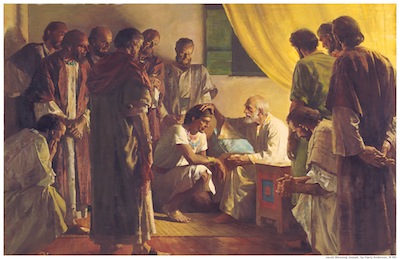
Future Of His Sons
“Jacob told the king that his years had been few and evil; that is, he had seen much trouble, and suffered much perplexity, which had cut short his years. The life of Jacob had not been smooth and peaceful. The jealousy of his wives had brought a train of evils. Some of his children had grieved him, and made his life very bitter. But the last years of Jacob's life were more peaceful. His sons had reformed.
As Jacob was about to die, his children gathered about him to receive his blessing, and to listen to his last words of advice to them. He forgave his children for all their unfilial conduct, and for their wicked treatment of Joseph, which had caused him many years of grief as he had reflected upon his supposed dreadful death. As he spoke with his children for the last time, the Spirit of the Lord rested upon him, and he uttered prophecies concerning them, which reached far in the future. While under the spirit of inspiration, he laid open before them their past lives, and their future history, revealing the purposes of God in regard to them. He showed them that God would by no means sanction cruelty, or wickedness. He commenced with the eldest. Although Reuben had no hand in selling Joseph, yet previous to that transaction he had grievously sinned. His course was corrupt, for he had transgressed the law of God. Jacob uttered his prophecy in regard to him: "Reuben, thou art my first-born, my might, and the beginning of my strength, the excellency of dignity and the excellency of power; unstable as water, thou shalt not excel."
He then prophesied in regard to Simeon and Levi, who practiced deception to the Shechemites, and then, in a most cruel, revengeful manner, destroyed them. They were also the ones who were the most guilty in the case of Joseph. "Simeon and Levi are brethren; instruments of cruelty are in their habitations. O my soul, come not thou into their secret; unto their assembly, mine honor, be not thou united! for in their anger they slew a man, and in their self-will they digged down a wall. Cursed be their anger, for it was fierce; and their wrath, for it was cruel. I will divide them in Jacob, and scatter them in Israel."
Jacob thus uttered the words of inspiration to his sorrowing sons, presenting before them the light in which God viewed their deeds of violence, and that he would visit them for their sins. His prophetic words in regard to his other sons were not as gloomy.
In regard to Judah, Jacob's words of inspiration were more joyful. His prophetic eye looked hundreds of years in the future to the birth of Christ, and he said, "The scepter shall not depart from Judah, nor a lawgiver from between his feet, until Shiloh come; and unto him shall the gathering of the people be."
Jacob predicted a cheerful future for most of his sons. Especially for Joseph he uttered words of eloquence of a happy character: "Joseph is a fruitful bough, even a fruitful bough by a well, whose branches run over the wall. The archers have sorely grieved him, and shot at him, and hated him; but his bow abode in strength, and the arms of his hands were made strong by the hands of the mighty God of Jacob. (From thence is the shepherd, the stone of Israel.)" "The blessings of thy father have prevailed above the blessings
of my progenitors, unto the utmost bound of the everlasting hills; they shall be on the head of Joseph, and on the crown of the head of him that was separate from his brethren."
Jacob was an affectionate father. The words he uttered to his children were not his, spoken because he had retained an unforgiving spirit on account of their wrongs. He had forgiven them. He had loved them to the last. He mourned deeply at the loss of Joseph, and when Simeon was retained in Egypt, he manifested grief, and expressed his anxious wish that his children should return safely from Egypt with their brother Simeon. He had no resentful feeling toward his sorrowing children. But God, by the spirit of prophecy, elevated the mind of Jacob above his natural feelings. In his last hours, angels were all around him, and the power of the grace of God shone upon him. His paternal feelings would have led him to utter, in his dying testimony, only expressions of love and tenderness. But under the influence of inspiration he uttered truth, although painful.
1SP 154-156